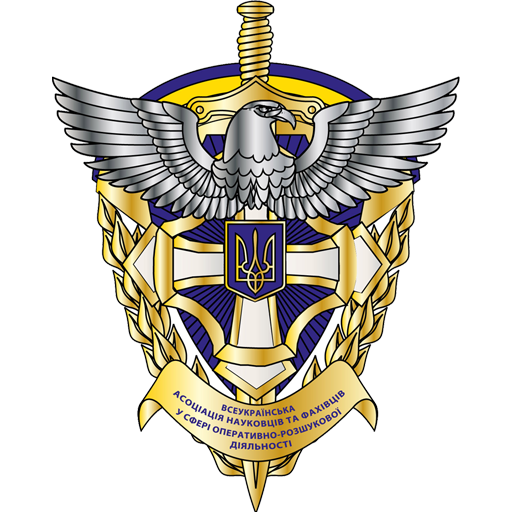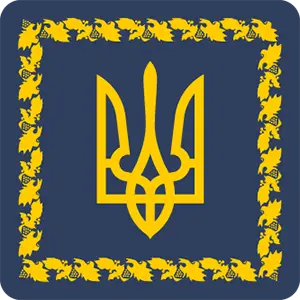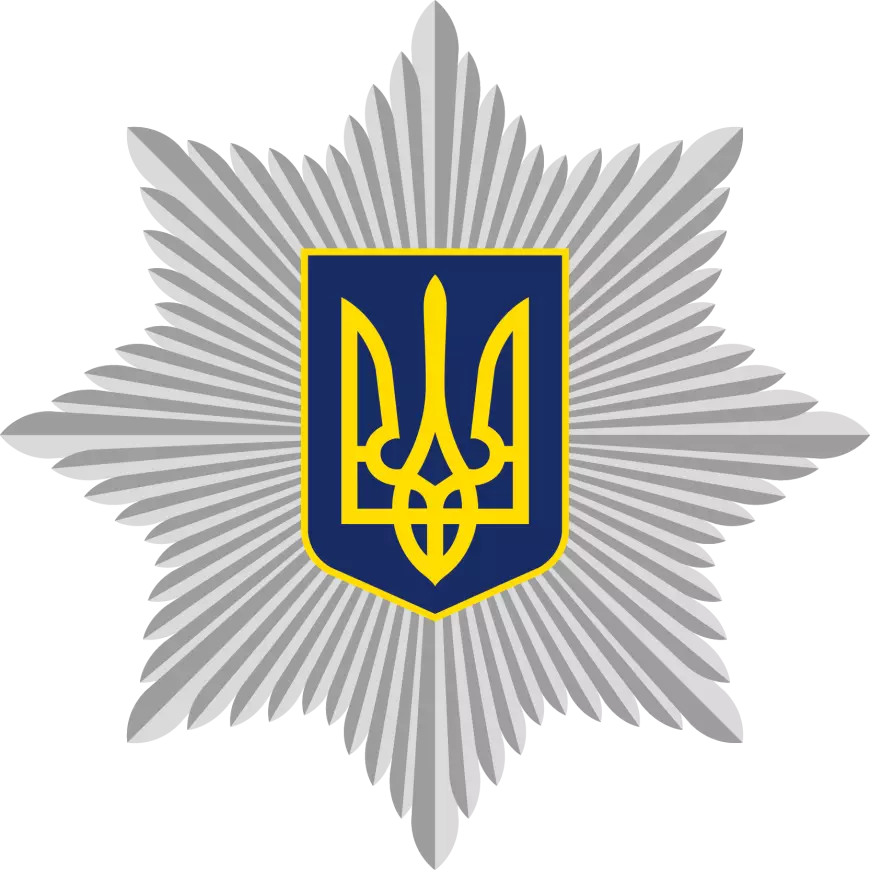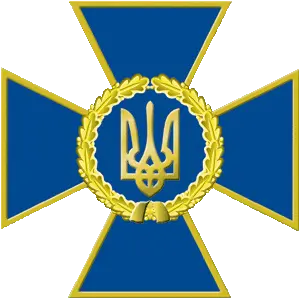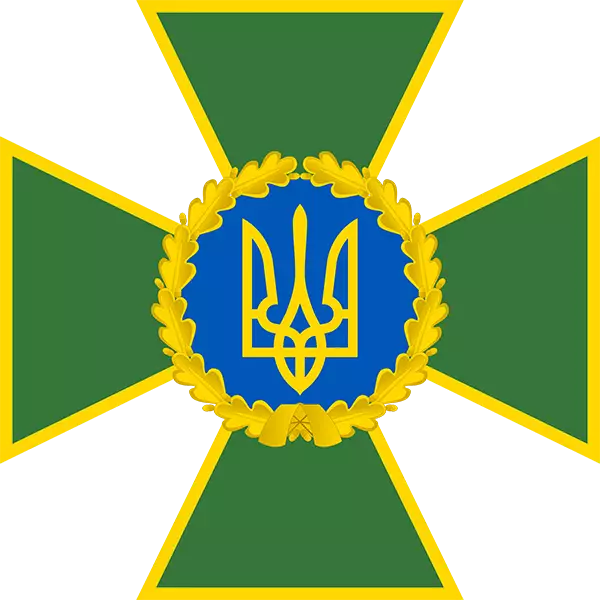All news
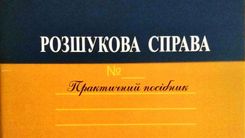
NEW EDITION FOR FUTURE POLICE OFFICERS
The Department of Operational and Investigative Activities of the Faculty of Training of Specialists for Criminal Police Units of the State Department of Internal Affairs of Ukraine, together with the All-Ukrainian Association of Scientists and Specialists in the Field of Operational and Investigative Activities, has prepared a new publication for future police officers.
Training of employees of operational units of the National Police is one of the main tasks of higher education institutions with specific training conditions of the Ministry of Internal Affairs of Ukraine, which train police officers. For graduates of educational institutions of the Ministry of Internal Affairs of Ukraine, which train police officers, the academic discipline "Operational and investigative activities" is one of the professional disciplines on which the practical activities of future employees of operational units of the National Police of Ukraine are actually based.
To help future police officers acquire practical skills, the Department of Operational and Investigative Activities of the Faculty of Training of Specialists for Criminal Police Units of the ODUVS, together with the All-Ukrainian Association of Scientists and Specialists in the Field of Operational and Investigative Activities, has prepared a new publication:
Investigative Affairs (Series: Theory and Practice of ORD): Practical Guide / S. V. Albul, T. G. Shchurat. Odesa: Publisher Bukayev Vadim Viktorovych, 2019. 30 p.
The main goal in developing the practical guide was to make it convenient for cadets of higher education institutions of the Ministry of Internal Affairs of Ukraine to master practical skills while studying the academic discipline "Operational and Investigative Activities".
The work was carried out in accordance with the List of priority areas of scientific support for the activities of the internal affairs bodies of Ukraine for the period 2015-2019, approved by the Order of the Ministry of Internal Affairs of Ukraine dated March 16, 2015 No. 275, the topics of scientific research of the Odessa State University of Internal Affairs - "Priority areas of development and reform of law enforcement agencies in the context of the deployment of democratic processes in the state", the topics of scientific work of the Department of Operational and Investigative Activities of the Faculty of Training of Specialists for Criminal Police Units of the State University of Internal Affairs "Legal and Organizational and Tactical Principles of Operational and Investigative Activities of the National Police of Ukraine".
The publication will be useful for employees of practical units of the National Police of Ukraine, as well as cadets, students and teachers of educational institutions that provide training, retraining and advanced training of employees of the National Police.
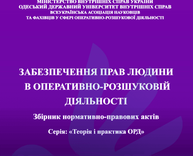
NEW EDITION FOR ALL-UKRAINIAN LAW WEEK
The All-Ukrainian Association of Scientists and Specialists in the Field of Operational and Investigative Activities, together with the Department of Operational and Investigative Activities of the Faculty of Training of Specialists for Criminal Police Units of the Odessa State University of Internal Affairs, prepared a new edition for the All-Ukrainian Law Week.
On December 4, 1950, the UN General Assembly session established International Human Rights Day. Two years earlier, the UN adopted the Universal Declaration of Human Rights, which became the first international document to clearly formulate provisions on human rights.
The Universal Declaration of Human Rights is a resolution of the UN General Assembly adopted in 1948, which is the most authoritative source of international human rights norms. The “Universal Declaration of Human Rights” was adopted by the UN General Assembly on December 10, 1948. It has been translated into 375 languages and dialects. The Declaration was a direct consequence of the experience of World War II and for the first time formulated the rights that every person should have. It consists of 30 articles, the content of which was clarified and developed through the institutions of international agreements, regional and national constitutions and laws. The Universal Declaration for the first time in history defined the range of fundamental human rights and freedoms. In addition to fundamental human rights, the Universal Declaration of Human Rights lists in detail political, civil rights and human freedoms, as well as rights in the economic, social and cultural spheres. This human rights document is based on a significant number of international human rights treaties that are binding and are part of the national legislation of Ukraine.
In Ukraine, every year in honor of the proclamation of the Universal Declaration of Human Rights by the UN General Assembly in 1948, the All-Ukrainian Law Week is held. The All-Ukrainian Law Week was held for the first time in 2008. The project was initiated by the Coordination Council of Young Lawyers of Ukraine under the Ministry of Justice of Ukraine. At the same time, the initiative of the young generation of lawyers was supported by the President of Ukraine, issuing Decree No. 1149 of December 8, 2008 “On the All-Ukrainian Law Week”.
The All-Ukrainian Law Week aims to introduce high legal standards, increase the level of legal education and legal culture of citizens, as well as create a strong democratic and legal state.
It was for the All-Ukrainian Law Week that the All-Ukrainian Association of Scientists and Specialists in the Field of Operational and Investigative Activities, together with the Department of Operational and Investigative Activities of the Faculty of Training of Specialists for Criminal Police Units of the Odessa State University of Internal Affairs, prepared a new publication for the All-Ukrainian Law Week:
Ensuring Human Rights in Operational and Investigative Activities (Series: Theory and Practice of ORD): Collection of Regulatory and Legal Acts / Compiled by S. V. Albul. – Odesa: Publisher Bukayev Vadim Viktorovych, 2019. 32 p.
The preface to the publication states that operational-search activities are a special type of state activity, which is carried out both openly and covertly by operational units of special state bodies, which are endowed with such powers by legislative acts. At the same time, operational-search activities belong to the types of legal activity in which there is a high probability of violations and oppression of individual human rights and freedoms. In this sense, the existence of procedural-legal and substantive-legal instruments to limit the possibilities of interference in the sphere of individual freedoms is an important factor in ensuring stable law and order.
Counteracting crime requires, first of all, modern and perfect regulatory and legal support. In the current conditions of reforming the system of law enforcement agencies, the issue of training specialists of a new formation, capable of ensuring the rights and freedoms of citizens, counteracting
criminal offenses, eliminating the causes and conditions that contributed to them, is acute.
The publication is a collection of excerpts from regulatory legal acts on issues of ensuring human rights and freedoms during operational-search activities and covert investigative (search) actions. The collection will be useful for employees of practical units of the National Police of Ukraine, as well as cadets, students, trainees and teachers of educational institutions that provide training, retraining and advanced training for employees of the National Police.
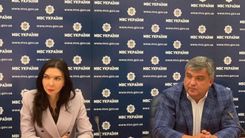
The Ministry of Internal Affairs working group on countering hybrid threats in the civil security sector continues its work
The working group of the Ministry of Internal Affairs on countering hybrid threats in the civil security sector continues its work. An expert survey has been completed (sample — 4,000 respondents), an analytical report has been prepared. Hybrid threats in the civil security sector have been identified, rated and ranked. The next step is to develop and implement effective internal policies of the Ministry of Internal Affairs and Central Executive Authorities on countering hybrid threats. We use facilitation methods and SWOT analysis as the basis.
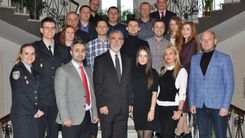
EUAM training on criminal analysis completed at the Department of Internal Affairs of Ukraine
On March 5, the Odessa State University of Internal Affairs completed a training with the participation of representatives of the European Union Advisory Mission on the topic: "Application of Criminal Analysis in Combating Crime" for employees of the Main Directorates of the National Police in the regions.
The training was delivered by the Head of the Department of Cybersecurity and Information Support, Police Major Karen Ismaylov, and the Head of the Department of Criminology, Forensic Medicine and Psychiatry, Police Major Oleksandr Zayets, who are certified trainers from EUAM on the application of criminal analysis by law enforcement agencies.
The training participants were employees of the structural units of criminal analysis of the Main Directorates of Kyiv, Odessa, Kharkiv, Lviv, Dnipropetrovsk, Kirovohrad regions and the city of Kyiv, as well as specialists from the Cyber Police Department.
During the training, the leading specialist of the European Union Advisory Mission, advisor/trainer on criminal investigations Tommy Peippo and the head of the criminal analysis department of the Main Police Department in Odessa region Oleksiy Voloshyn very informatively and clearly demonstrated their own practical experience in applying criminal analysis in combating crime.
Upon completion of the training, the Vice-Rector of the Odessa State University of Internal Affairs, Doctor of Law, Professor Serhiy Kuznichenko, congratulated all participants on the successful completion of the training and presented the relevant certificates.
In turn, the Senior Advisor of the EUAM Regional Representation on General Policing Georgios Pokas, who was also present during the ceremonial presentation of certificates, expressed his support and readiness for further fruitful cooperation, which will contribute to improving the qualifications of current employees of the National Police of Ukraine.
The topics of the training were as close as possible to the needs of practical workers. Therefore, the training participants acquired the skills necessary to analyze large amounts of information from various sources and form a high-quality report, which will certainly help them in their future work in law enforcement agencies and in the fight against crime.

MEMBERS OF THE ASSOCIATION PRESENTED A MODEL OF FIGHTING ECONOMIC CRIME TO EUROPEAN INSTITUTIONS
With the assistance of the Ministry of Foreign Affairs of Ukraine, the Embassy of Ukraine in the Netherlands, and the Committee of the Verkhovna Rada of Ukraine on Tax and Customs Policy, working meetings of the Ukrainian delegation with the participation of experts Nekrasov V., Melnyk V., Voloshyna M. with department directors and project managers of Europol, the Camden Interagency Asset Recovery Network (CARIN), and the law enforcement unit of the Netherlands Tax and Customs Administration (FIOD Belastingdienst) were held on March 18-21, 2019. During the meeting, the heads and experts were presented with the author's project on the Development of a modern model for combating economic crime, as well as global principles for the destruction of criminal business models and criminal infrastructure using analytical, organizational (procedural) and operational tools. The author's project is based on the modern ILP model and was used as the basis for the parliamentary bill "On the National Bureau of Financial Security". During the meeting with the leaders of the EMPACT project, which defines Europol's policy and strategic projects, as well as the CARIN groups, they agreed on further cooperation and meetings.
Special thanks to the representatives of the Embassy of Ukraine in the Netherlands for organizing the meetings.
ASSOCIATION MEMBERS AT THE SECURE SOCIETIES EVENT IN BRUSSELS
On March 13-14 in Brussels, at the Secure Societies 2019 event, our expert group had the honor to present several projects dedicated to resolving issues related to the protection of budget funds, the destruction of criminal business models in the economy, countering hybrid threats, as well as ways to increase the efficiency of financial investigations.
Immediately during the event, negotiations were held on the creation of consortia with representatives of France, Germany, Israel, Tunisia, and Poland.More than 400 people from 37 countries participated in this event. This is another step towards the establishment of the National Bureau of Financial Security in Ukraine.

Mastering the future profession of the Department of Criminal Analysis by cadets of the Internal Affairs Directorate
The internship of cadets of the Odessa State University of Internal Affairs in the Criminal Analysis Department of the National Police of Ukraine (Kyiv) has almost come to an end, so it is time to summarize the first results and outline promising areas of work.
The internship at such a high level was made possible thanks to the assistance of the Head of the Criminal Analysis Department of the National Police of Ukraine, Denys Olehovych Peftiyev, and the Rector of the Odessa State University of Internal Affairs, Ivan Petrovich Katerynchuk, who pay special attention to consolidating theoretical knowledge in practice.3rd year cadets Krivega Dariya, Taranyuk Vladislav and Bedriy Tetyana have been part of the Cyberspace Monitoring Center of the Department of Cybersecurity and Information Support of the Internal Affairs Directorate of the State Police of Ukraine for 3 years and skillfully perform tasks from the Cyberpolice Department and the Criminal Analysis Department to identify the presence of illegal content on the Internet, which is why they were selected to undergo internship at the Criminal Analysis Department of the National Police of Ukraine, where they improve their knowledge in the field of information technology and gain analytical skills.
Each cadet is assigned experienced employees of the Department, who explained to the cadets the main tasks of the unit, and also familiarized the cadets with Internet monitoring tools, methods and tactics for searching for operationally significant information and preparing analytical digests.
There is still a lot of hard work ahead, but we hope that the fruitful cooperation between the university and the Criminal Analysis Department will continue and take other forms for the sake of educating high-quality future police officers.

Participation of Association representatives in a roundtable on assisting law enforcement agencies in the delimitation of analytical powers
On December 4, 2018, the head of the association of scientists and specialists in the field of operational and investigative activities, Honored Worker of Science and Technology of Ukraine, Doctor of Law, Professor Oleksandr Korystin took part in a roundtable on assisting the National Police of Ukraine and the Ministry of Internal Affairs of Ukraine in the delimitation of analytical powers (functions) in the police, which is part of the concept of analytics-driven law enforcement (ILP), which was organized by the EU Advisory Mission to Ukraine (EUAM).
During the roundtable, Deputy Chief of Police of Romania, Vili Apreutesei, spoke about the Romanian model of law enforcement driven by analytics, which, reflecting the best European practices, has already proven its effectiveness and can be an example for Ukraine.
The participants of the event, including: employees of the central office of the National Police, representatives of the Ministry, the Research Institute of the Ministry of Internal Affairs and the Odessa State University of Internal Affairs, voiced their ideas and concerns, and also agreed on further projects on the delimitation of analytical powers and decisions of law enforcement driven by analytics.
As the Deputy Head of EUAM Fredrik Wesslau noted: “Without full-fledged police analysis, it is difficult to carry out law enforcement activities, in the context of ensuring public order, criminal investigations or crime prevention.
As a next step, EUAM proposed to establish a working group on the delineation of analytical powers and the harmonization of analytical functions in the NPU, consisting of representatives of the mission, the NPU, and the Ministry of Internal Affairs.
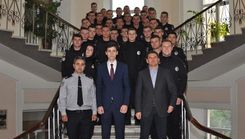
The role of criminal analysis in the activities of the National Police of Ukraine
The Head of the Criminal Analysis Department of the National Police of Ukraine, Police Lieutenant Colonel Denis Peftiev, paid a working visit to the Odessa State University of Internal Affairs.
At the beginning of his visit, the Head of the Criminal Analysis Department met with the leadership of the higher education institution. During the meeting, specific measures of interaction between the university and the Criminal Analysis Department were discussed, which are aimed at improving the practical component of the training of higher education applicants.
Then, Denis Peftiev gave an open lecture to future investigators and scientific and pedagogical workers of the university, during which he familiarized those present with the history of the creation, structure and tasks of the criminal analysis units of the National Police of Ukraine, provided a list of information resources and tools that analysts use in their work, and gave practical examples of involving the Department's employees in the investigation of high-profile crimes that were committed in Ukraine recently.
At the end of the event, Denis Peftiev was introduced to the staff of the research laboratory on problematic issues of criminal analysis, which is the only one in the system of the Ministry of Internal Affairs of Ukraine. In addition, a detailed professional discussion took place on the issues of introducing criminal analysis methods into the activities of the National Police, and joint scientific and methodological events were planned.
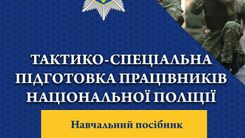
MODERN MANUAL FOR NATIONAL POLICE OFFICERS
Intensive changes in the law enforcement system of Ukraine, in particular, bringing the work of the National Police to modern European and world requirements, in addition to creating an appropriate regulatory basis for such activities, require improving the professional training of police officers, increasing professionalism and efficiency. After all, the effectiveness of police actions is generally assessed, taking into account the activities of specific police officers - their ability to communicate with citizens, make legal and correct decisions, behave adequately in typical and extreme situations, detain offenders, etc.
At the same time, the high level of performance by police officers of their professional duties related to the protection of public order and security, the fight against crime, is based on proper training, both general theoretical and special - professional. Taking this into account, the process of professional training of police officers as an organized continuous and purposeful process of mastering knowledge, special skills and abilities necessary for the successful performance of operational and service tasks, not only does not lose, but, on the contrary, acquires increasingly important importance.
The basis of professional training of a police officer is proper tactical and special training - individual tactical training for actions in typical and extreme situations, as well as preparation for such actions as part of service detachments and groups. It is precisely with the aim of high-quality training of future police officers, proper methodological support of the educational process that scientists from the Odessa State University of Internal Affairs and the Lviv State University of Internal Affairs have prepared a new modern textbook:
Tactical and special training of employees of the National Police / S.V. Albul, O.T. Nikolaev, O.I. Törlo, Y.R. Yosypiv and others. Odesa; Lviv: ODUVS; Lviv State Internal Affairs Department, 2018. – 480 p.
Among the co-authors is the deputy chairman of our Association, candidate of legal sciences, associate professor, police colonel Serhiy Albul.
The manual contains thorough information on tactical and special training on updated topics. The material is presented, which fully complies with the regulatory framework of the National Police of Ukraine, which makes it possible to use it in the educational process of higher education institutions of the Ministry of Internal Affairs of Ukraine and in the system of in-service training of police units. Topics are presented that provide an opportunity to conduct classes in a high quality manner, as well as to prepare independently.
The reviewers of the manual were scientists and employees of practical units of the National Police of Ukraine.
